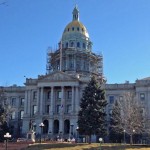A flyer recently mailed to Littleton Public Schools (LPS) residents asking them to contact their state legislators about an education funding plan cost the district nearly $10,000.
LPS Superintendent Brian Ewert sent out a newsletter earlier this month asking residents to support a possible bill that would remove the hospital provider fee from the general fund and convert it to an enterprise fund – thereby exempting the fee from counting toward the state’s constitutional revenue limit under the Colorado Taxpayer Bill of Rights (TABOR) and potentially opening the door to increased education funding.
The hospital provider fee is a fee charged to hospitals for each bed used by a patient daily. The revenue goes to fund the state’s expansion of Medicaid. By removing it from the general fund, it is predicted it would free up more than $600 million under the TABOR’s revenue cap. That would prevent automatic refunds to Colorado residents and possibly allow for more education funding.
Joint Budget Committee Chairman Kent Lambert-R has called the controversial maneuver a shell game in its effort to skirt TABOR laws.
The tri-fold, full-color, glossy mailer from the school district is Ewert’s first informational flyer since taking over as superintendent this year Continue reading




